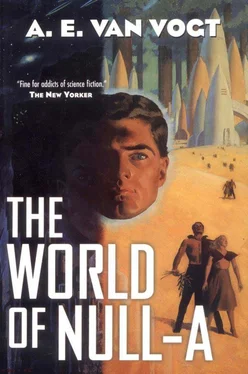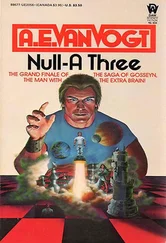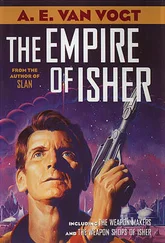The words spoken, he glanced at his watch to emphasize the time limit. He stared, startled, and briefly forgot his purpose with Prescott. The time was fourteen minutes after four. Four minutes gone! He had an empty feeling, a qualm, the first shocked thought that Dr. Kair had been gone a long time. He saw that Prescott was gray, and that steadied his own nerves. Prescott said in a curious uneven tone, “The Distorter is in Patricia Hardie's apartment. We built it in to look like a part of one wall.”
The man looked on the verge of collapse. And his story had the sound of truth. The “Distorter”–the very naming of it was a partial verification- had to be located near the Machine, and they would obviously try to conceal it. Why not in Patricia Hardie's room? Gosseyn suppressed an impulse to get the lie detector. Suppressed it because he had Prescott on the run, and the introduction of a machine might be fatal. But he couldn't prevent himself from taking another glance at his watch. It was 4:15 A.M. Gosseyn glared at the door. Time was calling his bluff. He began to understand the pressure Prescott had endured. With an effort he forced his attention back to the man.
“Where,” he urged, “did you get the 'Distorter'?”
“Thorson brought it. It's being used illegally, since its use is forbidden by the League except for transport, and–”
A sound at the door silenced him. He relaxed with a sick grin as Dr. Kair came in, breathless.
“No time to waste,” said the doctor. “It's getting light outside, and the fog is beginning to clear. I told them we were leaving right away. Come on.”
He snatched up the leather case containing the test material about Gosseyn's brain. Gosseyn stopped him long enough for them to gag Prescott, long enough for him to have time to think, and say, “But where are we going?”
Kair was as gleeful as a boy who has tasted adventure. “Why, we're taking my private roboplane, of course. We're going to act just as if we're not being watched. As to where we're going, I'm sure you don't expect me to mention that in front of Mr. Prescott, do you? Particularly since I'm going to drop his shoes, with the locator device in them, before we're clear of the city.”
In five minutes they were in the air. Gosseyn looked out into the pressing fog and felt the exultation gathering in him.
They were actually getting away.
Gosseyn sank deeper into his seat in the roboplane and glanced at Dr. Kair. The psychiatrist's eyes were still open, but he looked very sleepy. Gosseyn said, “Doctor, what is Venus like-the cities, I mean?”
The doctor rolled his head sideways to look at Gosseyn, but did not move his body.
“Oh, much like Earth cities, but suited to the perpetually mild climate. Because of the high clouds it never gets too hot. And it never rains except in the mountains. But every night on the great verdant plains, there's a heavy dew. And I mean heavy enough to look after all the luxuriant growth. Is that what you're getting at?”
It wasn't. “I mean the science.” Gosseyn frowned. “Is it different? Is it superior?”
“Not one whit. Everything ever discovered on Venus is immediately introduced on Earth. As a matter of fact, research on Earth is ahead of Venus on some things. Why shouldn't it be? There are more people here, and specialization makes it possible for minds of middling intelligence-even unsane minds-to invent and discover.”
“I see.” Gosseyn was intent now. “Tell me, then. From your knowledge of Earth and Venusian science, what is the explanation for two bodies and the same personality?”
“I intended to think about that in the morning,” said Dr. Kair wearily.
“Think about it now.” Gosseyn was persistent. “Is there any explanation on the basis of solar science?”
“None that I know of.” The psychiatrist was frowning. “There's no question, Gosseyn. You've hit at the heart of this situation. Who discovered such absolutely radical processes? I have no doubt there have been some potent biological experiments undertaken in the solar system by semantically trained biologists. But two bodies and a new brain!”
“Notice,” said Gosseyn softly, “both sides have something. The miracle of my strange immortality was a product of somebody who opposes the group that owns the Distorter. And yet, Doctor, my side-our side-is afraid. It must be. If it had comparable strength, it wouldn't play this hidden game.”
“Hm-m, you seem to have something there.”
Gosseyn persisted, “Doctor, if you were a human being powerful enough to make decisions of planetary importance on your own, what would you do if you discovered that a galactic empire was organizing to seize an entire sun system?”
The older man snorted. “I'd rouse the people. The strength of null-A has yet to be tested in battle, but I have an idea it will show up well.”
Several minutes passed before Gosseyn spoke again. “Where are we going, Doctor?”
Dr. Kair perked up for the first time. “There's a cabin,” he said, “on an isolated shore of Lake Superior where I stayed a couple of months three years ago. It seemed such an ideal place for quiet thought and research that I bought the place. And then never went back, somehow.” He smiled wryly. “I'm pretty sure we'll be safe there for a while.”
Gosseyn said, “Oh!”
He sat there estimating the time that had passed since their flight began. He decided half an hour had gone by. Not bad, in a way. A man who could in thirty minutes realize that the enticing easy path was not for him had come a long distance toward domination of his environment. It was enticing to think of lying for hours on some sandy beach, with nothing to do but take mind exercises, in a leisurely fashion, under the guidance of a great scientist. The one flaw in the picture was a rather tremendous one. It wouldn't be like that at all.
He pictured Dr. Kair's cabin hideout. There would be a village near by, and perhaps some farms and fishermen's homes. Three years before, with a clear conscience, intent on his own purposes, the psychiatrist would have been almost unaware of these addenda to his surroundings. He had probably caught up on his reading and gone for meditative walks on lonely shores, and the occasional habitant whom he met would have been a person seen but not really considered. That didn't mean that the doctor himself would have been unremarked. And the chances of two men coming to that cabin immediately after the assassination of Hardie and not being closely observed were-well, they were zero.
Gosseyn sighed. For him there could be no time for settling down on some lake-shore pasture, there to vegetate while the inhabited worlds of the solar system rocked under the impact of invading armies. He stole another look at the doctor. The man's shaggy head was drooped against the back of his seat; his eyes were closed. His chest rose and fell with regularity. Softly, Gosseyn called, “Doctor!”
The sleeper did not stir.
Gosseyn waited a minute, then slipped to the controls. He set them to make a wide half circle, and head back in the direction from which they had come. He returned to his seat, took out his notebook, and wrote:
Dear Doctor:
Sorry to leave you like this, but if you were awake we'd probably only argue. I am very anxious to undergo mind training, but there are urgent things to do first. Watch the evening paper personals. Look for an ad signed by “Guest.” If answer is necessary, sign yourself “Careless.”
He stuck the note into the controls and then strapped on one of the ingravity parachutes. Twenty minutes later, the atomic light of the Machine showed through the fog. Once more, Gosseyn set the controls for a wide half circle, so that the plane would return to its original course.
Читать дальше










